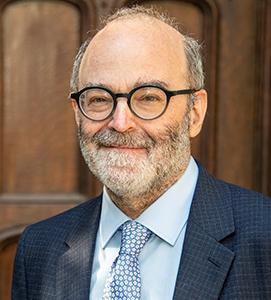James Theodore Robinson

MPhil (Oxford University)
MA, PhD (Harvard University)
James Theodore Robinson is the Dean of the Divinity School. The Nathan Cummings Professor of Jewish Studies, he is also Professor of the History of Judaism, Islamic Studies, and the History of Religions in the Divinity School and the College. He is also appointed in the Program on Medieval Studies, Religious Studies, Fundamentals: Texts and Issues, and the Joyce Z. and Jacob Greenberg Center for Jewish Studies, and he is an affiliated member in the Department of Near Eastern Languages and Civilizations.
Robinson’s research focuses on medieval Jewish intellectual history, philosophy, and biblical exegesis in the Islamic world and Christian Europe. His main interests lie in the literary and social dimensions of philosophy, and the relation between philosophy and religion. Specific areas of expertise include ethics, political philosophy, and psychology; the history of philosophical-allegorical exegesis; Karaites and Rabbanites; the translation and reception of Greek and Arabic philosophy and science; Jewish Sufism and Neoplatonism; Maimonides, Maimonideanism, and the Maimonidean controversies; religious polemic; sermons and homiletical literature; and the interactions between the Jewish, Islamic, and Christian intellectual traditions.
Dean Robinson has published four books and three edited volumes: Samuel Ibn Tibbon’s Commentary on Ecclesiastes, The Book of the Soul of Man (Texts and Studies in Medieval and Early Modern Judaism 20. Tübingen: Mohr Siebeck, 2007); (editor) The Cultures of Maimonideanism: New Approaches to the History of Jewish Thought (Leiden and Boston: E.J. Brill, 2009); Asceticism, Eschatology, Opposition to Philosophy: The Arabic Translation and Commentary of Salmon b. Yeroham on Qohelet (Ecclesiastes) (Leiden and Boston: E.J. Brill, Karaite Texts and Studies, 2012); The Arabic Translation and Commentary of Yefet b. ‘Eli the Karaite on the Book of Joshua (Leiden and Boston: E.J. Brill, Karaite Texts and Studies, 2014); Sefer Nefesh ha-Adam: Perush Qohelet li-Shemuel ben Yehudah Ibn Tibbon (Jerusalem: World Union of Jewish Studies, The David and Amalia Rosen Foundation, Sources for the Study of Jewish Culture, 2016); (co-editor) Medieval Jewish Philosophy and Its Literary Forms (Bloomington: Indiana University Press, 2019); (co-editor) Maimonides’ Guide of the Perplexed in Translation: A History from the Thirteenth Century to the Twentieth (Chicago: The University of Chicago Press, 2019).
His courses have included Jewish Philosophy in the Middle Ages; Medieval Commentaries on Ecclesiastes; Readings in Maimonides’ Guide of the Perplexed; Abraham in History, Literature, and Thought (with Hans-Josef Klauck); The Jewish Study of the Bible in the Middle Ages; The Jews in Medieval Spain; Interactions between Jewish Philosophy and Literature in the Middle Ages; Jewish Heretics and Apostates in the Middle Ages; Soul, Intellect and Immortality in Medieval Jewish Thought; Science and Scripture: Jewish Philosophical Exegesis in the Middle Ages; A Medieval Menagerie: Animal Spirituality in the Middle Ages; Readings in Abraham Ibn Ezra; Medieval Jewish Thought: Philosophy, Sufism, Kabbalah; The Buddha in Barcelona (with Matthew Kapstein); Reading Hayy ibn Yaqzan; Jerusalem Civ II (Medieval): “Conquest, Pilgrimage and the Imaginaire”; Reading Other People’s Scriptures (with Lucy Pick); Islamic and Jewish Neoplatonism; Maimonides as Mystic (A study of Guide 3:51); Comparative Scriptural Interpretation (with Margaret M. Mitchell); Maimonides, Eight Chapters and Commentary on Avot; Medieval Commentaries on Psalms; Introduction to Judeo-Arabic Literature and Thought; Aristotle in the Middle Ages; Jewish Sufism; The Bible in Arabic; Maimonides on the Problem of Evil (a study of Guide 3:8-12); Arabic Religious Texts (with Michael Sells); The Occult in the Islamic World (with Alireza Doostdar); Judah Halevi’s Kuzari (with Ralph Lerner); The “Science of Letters” in Judaism and Islam; Jewish Superheroes; Introduction to Kabbalah; Jerusalem Civ III (Modern): “Ethnographies of Everyday Life -- Experiencing Jerusalem through Clothing, Music, Food”; Moroccan Civ II: “Philosophers, Sufis, and Statesmen in the Medieval Maghrib;” Ethics in al-Andalus (with Yousef Casewit).

